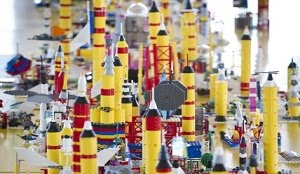In dueling PowerPoint presentations before the 10-member panel, appointed by the Obama administration in April, NASA officials defended their progress in developing the next generation of rockets, while challengers said that they could do the job more quickly and less expensively.
NASA officials said the Ares I, the first rocket being developed in the agency’s Constellation program, was on course for launching astronauts to the International Space Station in March 2015, despite technical hurdles and lower-than-expected budgets.
In an interview, Steve Cook, manager of the Ares Project at the Marshall Space Flight Center in Huntsville, Ala., said that the cost estimate for developing the Ares I and seeing it through its first manned flight was $35 billion. Contrary to the claims of critics, he said, costs have not spiraled out of control.
“We’ve got a stable plan to get us to 2015,” Mr. Cook said.
But Michael C. Gass, president and chief executive of United Launch Alliance, a joint venture of the Boeing Company and Lockheed Martin, asked the panel to consider “potential credible alternatives” to Ares I.
The Delta IV Heavy rocket, which carries satellites into orbit for the military and other customers, could be upgraded for astronauts and perform the tasks of Ares I. The Delta IV would be safer and cheaper and could be ready in 2014, Mr. Gass said.
A NASA-commissioned study by the Aerospace Corporation concluded that the Delta IV could replace the Ares I, possibly at lower cost, but raised questions of how to move beyond low Earth orbit.
The Aerospace study also concluded that upgrading the Delta IV to carry astronauts would take five and a half to seven years, although on Wednesday several members of the panel appeared skeptical that it would take that long.
In NASA’s plan, the Ares I would use solid rocket motors and a second-stage engine that would be reused in the design of the Ares V, a much larger rocket to carry the heavy cargo needed to get to the Moon or Mars. Mr. Gass, however, said that more powerful versions of Delta and Atlas rockets could be developed to serve the role envisioned for the Ares V.
Advocates of another alternative to the Ares rockets, known as Direct and devised by unidentified engineers ostensibly within NASA, also presented their idea to the panel: to shift components of the space shuttle into a new series of rockets. They, too, asserted that their option would be cheaper and faster than the NASA plan.
The review panel, led by Norman R. Augustine, former chief executive of Lockheed Martin, was appointed by the Obama administration to re-evaluate NASA’s human spaceflight program and make recommendations by the end of August. The daylong meeting on Wednesday, at the Carnegie Institution of Washington, was the first of four planned public sessions.
Senator Bill Nelson, a Florida Democrat who is a leading lawmaker on NASA issues, told the panel that its recommendations would probably shape the United States’ space program for years to come and that supporters of any competing vision would be hard pressed to gain support in Congress.
“You come to the table with extraordinary influence,” Mr. Nelson said.
As the panel held its meeting to explore NASA’s future, the agency’s present remained firmly on the ground.
The space shuttle Endeavour had been scheduled to lift off at 5:40 a.m. Wednesday on a 16-day mission to the space station, but a leak in a vent line that relieves hydrogen gas pressure in the external tank scuttled the launching. A similar leak foiled the first launching attempt, on Saturday.
High levels of hydrogen near the tank pose a danger of fire or explosion.
“We’re going to step back and figure out what the problem is and go fix it,” said LeRoy E. Cain, the deputy shuttle program manager, in a news conference after the launching was canceled. “And then we’ll fly as soon as we’re ready to safely resume.”
The next chance to launch is July 11.
“I have the sense this is something we’ll fix pretty quick,” said John Shannon, the shuttle program manager, who was in Washington for the hearing.




0 comments:
Post a Comment